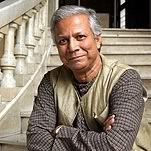Blog Action Day 2008: Poverty and the Microfinance Movement
 I got turned on to the idea of microfinance by the man who is famous for it, Professor Muhammad Yunis. He won the Noble Peace Prize along with his organization Grameen Bank in 2006. At the time, I was at Ewha Womans University at the Graduate School of International Studies. Right after he won the Noble Peace Prize, he came to Ewha to speak. I, along with other Ewha students and some people from the general public, got to hear his story about about how he made his idea of microfinance a success in his native country of Bangladesh.
I got turned on to the idea of microfinance by the man who is famous for it, Professor Muhammad Yunis. He won the Noble Peace Prize along with his organization Grameen Bank in 2006. At the time, I was at Ewha Womans University at the Graduate School of International Studies. Right after he won the Noble Peace Prize, he came to Ewha to speak. I, along with other Ewha students and some people from the general public, got to hear his story about about how he made his idea of microfinance a success in his native country of Bangladesh.
Being a student, I was lucky enough to ask him a question. I asked him about how he envisioned microfinance working in more developed countries like the States. I asked because I come from a working class background. My father was a blue collar worker and my mom was a housewife. My parents figured out the benefit of credit and never had problems. However, in the neighborhood I grew up in, they're the exception rather than the rule it seemed. As a result, I was a lucky (and spoiled) only child, who didn't want for much. Others in my neighborhood weren't so lucky. As a result of white flight, the neighborhood was a mix of working class families and those on public assistance. The working class families, for the most part, did alright as did some on public assistance, I'm sure.
Just across the street there were many who were struggling with unemployment, drugs and goodness knows what else. My neighborhood went from a pretty calm place to a place where the cops showed up way too often and gang members loitered for a bit too long. My mom was very keen on limiting my exposure to all that was going on at that time, so I can't give you many details. I just know it was about getting to school and getting back home safe and sound without incident. We made it like most families there did. However, it did leave me with a keen sense of haves vs. have-nots even on that small scale.
So, what can be done to help people in those situations? Poverty in a developed country is more nuanced in some ways because those in it are often portrayed as shiftless and lazy. However, I know it's not about being shiftless and lazy. I know some shiftless and lazy trust fund babies too. What is more on point is the issue of really feeling powerless, lacking knowledge and being ill equipped. So how can you help those in poverty who are in developed countries?
Yumis said they were planning to get involved in microfinance in the US and sure enough they have. I'm still half a world away, so there isn't much I can do to help right now. But maybe that email I got from a contact I made when I met Dr. Yunis about Grameen America will still be good when I finally choose to return.
In the meantime, I help where I can. I'm a member of Kiva.org and I've helped two entrepreneurs, one in Ghana and the other in Mexico, get the loans they need to expand their business. I don't have much, but it doesn't take much to help someone with microfinance because these are very small loans. I'm proud to say that I just got an email letting me know that one of the two I loaned to has paid back 14% of her loan. I do hope it helps her rise up out of poverty.
With the economic crisis, everyone is concerned about their finances. However, put it in perspective. Languishing over the diminished value of their 401Ks is probably an issue they never wrestle with. It's simply about getting enough money to fund a small business, so they can make a living. Just a few dollars can help someone and, I think, it's worth it.
Even if lending to someone in need is beyond your means right now, you can still get involved in fighting poverty.
Here is a list of what one person can do from the Blog Action Day website: What Can One Person Do?
Here is the accompanying video. The video is tinged with religion, but you can be an atheist or agnostic and recognize that collective action is needed to help eradicate poverty:












I've been a silent reader for a while, but I'm breaking my silence to tell you how much I enjoyed this post! When I first heard of microfinance, the sheer simplicity of it really shocked me. I'm one year from graduating school and looking into grad school at Ehwa (either that or Beijing U.) Keep of the great job!
ReplyDeleteHey thanks!
ReplyDeleteMicrofinance IS a simple idea that, for the most part, works. I got another email saying letting me know I've been partly paid back on my other loan. Really, most people just need some knowledge and a hand.
BTW, sorry it's been the Obama blog for weeks now. Once he wins, and he will, the tone will revert back to what it was ;) ...maybe...